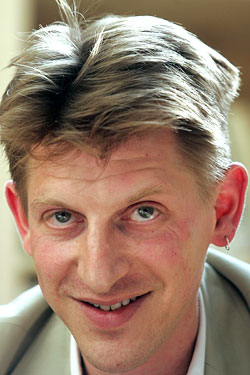
There are all kinds of reasons why Jonathan Littell’s novel The Kindly Ones should spur debate. Written in French by the somewhat reclusive American-born (and Jewish) son of thriller writer Robert Littell, it’s the nearly 1,000-page-long unrepentant confession of an SS officer in hiding, a sort of evil Forrest Gump, who flits between the Ukraine, Auschwitz, and Hitler’s bunker when he isn’t reminiscing about sleeping with his twin sister, possibly killing his mother, and inserting various foreign objects into his rectum. So yeah, we thought the novel, published in France three years ago and released in English this week, might be polarizing. But maybe not this polarizing. The reactions break down pretty neatly.
The Kindly Critics
Who: Most of the French, some of the English, Holocaust survivors.
Arguments: In France, where Littell was only the second author to win both the Prix Goncourt and the Grand Prix, critics compared him to Flaubert, Stendahl, Mailer, Balzac, Bach, Genet, Styron, and Bret Easton Ellis. Da Vinci Code–style, his book inspired two related works within six months, and was declared “a new War and Peace.” In the Times of London, historian Anthony Beevor called it “a great work of literary fiction, to which readers and scholars will turn for decades to come.” Among survivors praising the novel was Goncourt jury member Jorge Semprun, who said it was proof that “the novel is better suited than any other form of literature in drawing attention to history.”
Subtext: An American choosing to live in France and write in the great, glorious language? Magnifique! France is also going through a phase of literary hand-wringing. “Most of today’s young French writers are navel-gazers,” Semprun has said. For survivors and some scholars, bringing attention to the Holocaust is almost always a good thing in itself.
Ambivalent Critics
Who: Some Brits, some Canadians, Shoah director Claude Lanzmann.
Arguments: Lanzmann, whose Holocaust documentary Littell credited with inspiring the novel, initially called the book “completely unconvincing” and “a poisonous flower of evil.” Then he changed his mind: “There are some magnificent things in it … the more I think about it the more I think Littell was justified in writing his novel.” According to the AP, it “manages to be a near-masterpiece of historical fiction and at the same time a bloated, overlong masturbatory fantasia of sex and violence.” And per the Financial Times, it “fails magnificently.”
Subtext: Wins points among the kinds of critics who love to equivocate about ambitious messes, guardians of the Holocaust who find the book disgusting and gratuitous but historically revealing, and those who admire it for stirring debate but hope to keep their noses clean of it.
Mean Critics
Who: Some Brits, most academics, and almost all Americans.
Arguments: The New York Times delivered two pans. Michiko Kakutani wrote that its fans “have mistaken perversity for daring, pretension for ambition, an odious stunt for contrarian cleverness.” Holocaust historian Eduoard Husson called it “a massive practical joke,” based on the sheer implausibility of the premise. The Sunday London Times’ Peter Kemp put it all in the headline: “Criminally Inane: Why has this inept novel of guilt, retribution and Nazi war atrocities been so highly praised? The horror, the horror” (online, the review’s missing the original headline).
Subtext: Historians, perhaps protecting their turf, are staking their claim on the Holocaust as something that should be examined through the lens of literal truth. The Americans tend to be more focused on style and entertainment value (as in David Gates’s backhanded comment on the book’s “Tolstoyan heft, Dostoyevskyan darkness and Proustian sentence length”). They also like shouting “The Emperor has no clothes” as often as possible. And hey, if you’re an American, speak American, damn it!





